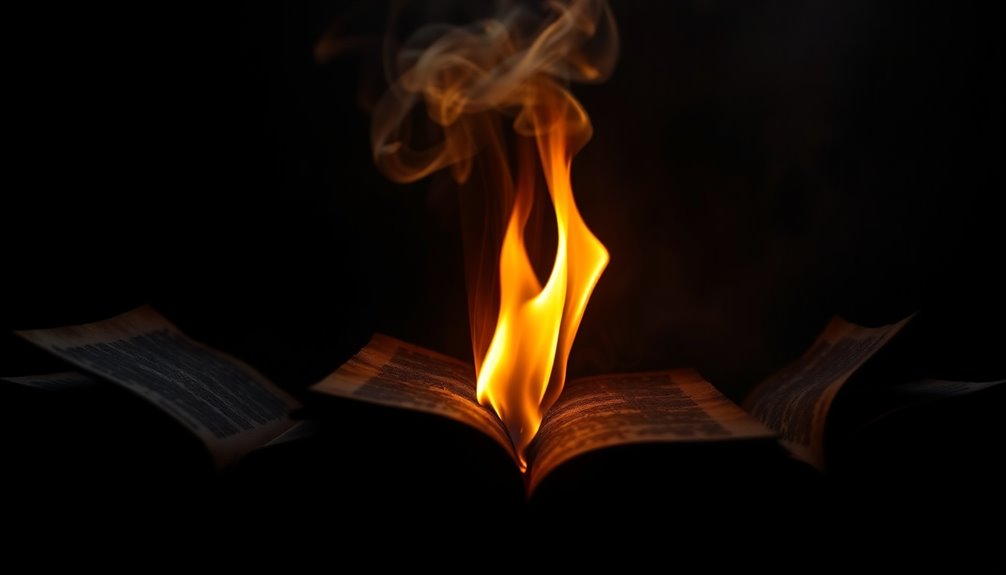In "Fahrenheit 451," fire is a strong symbol that changes throughout the story. At first, it represents destruction and the loss of knowledge, as firefighters burn books. Montag, the main character, enjoys this fire, believing it to be powerful. However, as he learns more, fire becomes a sign of hope and new beginnings. It lights the way to truth and understanding, much like a phoenix rising from the ashes. Key characters, like Montag and Clarisse, show how fire can lead to transformation. If you keep exploring this theme, you'll discover even more about its meaning and impact!
Key Takeaways
- Fire initially symbolizes destruction and censorship, representing the loss of knowledge through the burning of books.
- Montag's journey transforms fire into a symbol of enlightenment and renewal, illuminating truth rather than suppressing it.
- The self-immolation of a woman highlights fire's power as a form of defiance against societal oppression and censorship.
- Captain Beatty manipulates fire to uphold authoritarian control, using it as a weapon against dissent and individual thought.
- Ultimately, fire represents hope and rebirth, illustrating the struggle for knowledge and freedom in a repressive society.
The Nature of Fire
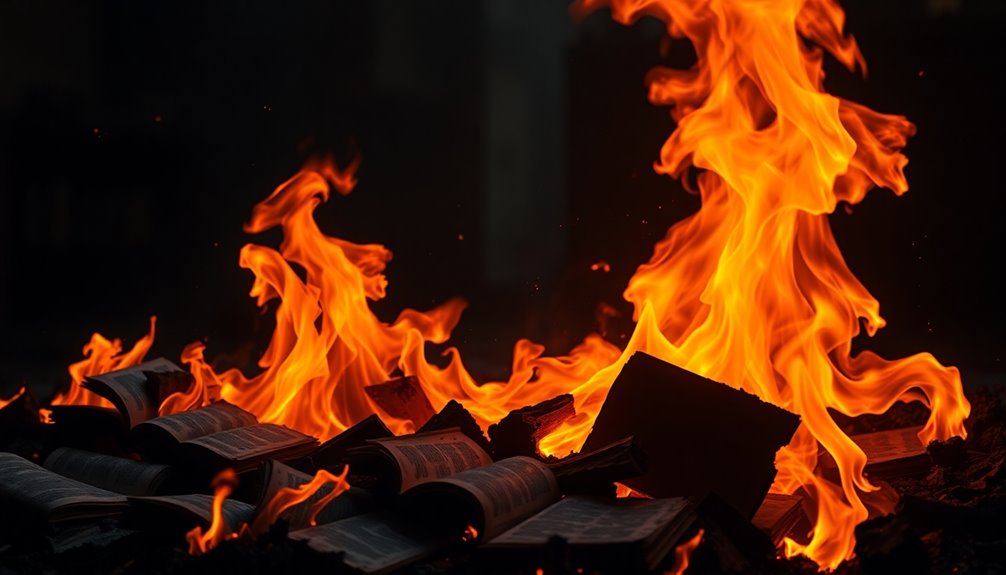
Fire in "Fahrenheit 451" embodies a complex duality that shapes the narrative and Montag's journey. At first, fire symbolizes destruction. Montag, like other firemen, uses it to burn books, suppressing knowledge and enforcing government control. The phrase "It was a pleasure to burn" shows how Montag initially enjoys the fire's power, reflecting society's twisted values. People are taught to love destruction rather than creation.
However, as Montag's journey unfolds, fire takes on a new meaning. It becomes a catalyst for transformation and rebirth. He begins to question the world around him, realizing that fire can also purify and enlighten. This internal conflict between conformity and the pursuit of knowledge leads him to see fire as both a tool of oppression and a means for change.
Ultimately, fire represents hope and new beginnings, much like the phoenix that rises from ashes. From destruction can come understanding and a more enlightened society.
As you explore Montag's journey, you'll discover how fire fuels his transformation, leading him to seek truth and challenge the oppressive world he once accepted. Fire, in all its complexity, plays a crucial role in his quest for knowledge and freedom.
Fire as Destruction
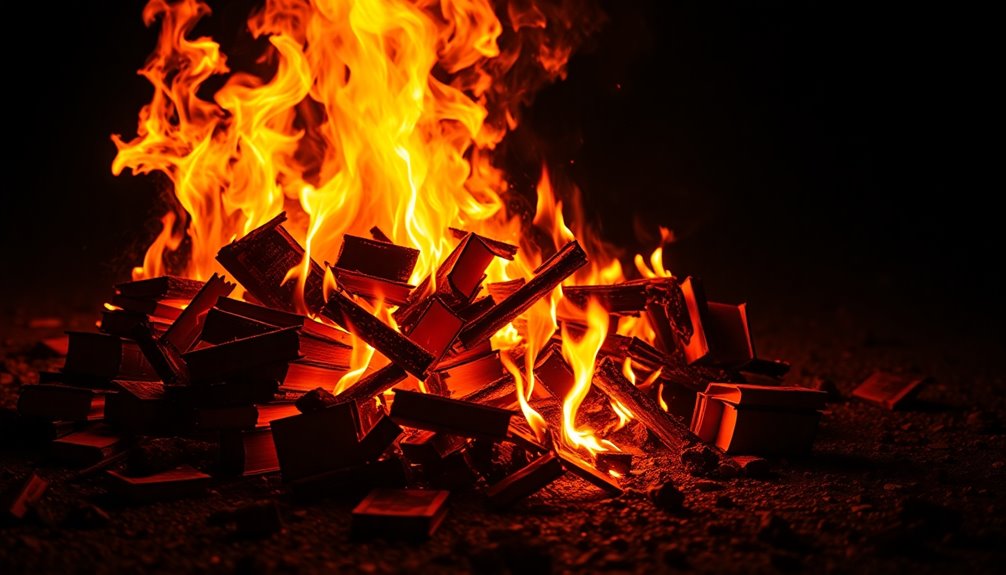
Fire in "Fahrenheit 451" shows its destructive power in a big way!
When books burn, they're not just paper; they're the loss of ideas and knowledge.
This destruction highlights how censorship can erase individual thoughts and creativity, making us think about the importance of what we read and learn.
Destructive Power of Fire
In "Fahrenheit 451," flames serve as a potent symbol of destruction, illustrating how the government wields fire to obliterate books and, with them, the essence of knowledge and critical thought. Fire symbolizes a destructive force that erases freedom of thought. When firefighters, marked by the number 451, burn books, they don't just destroy paper; they destroy ideas and dreams.
Montag uses fire initially with excitement, as he finds pleasure in burning. This shows how deeply society has fallen into censorship and conformity. However, the self-immolation of a woman who chooses to die with her books highlights a powerful act of defiance. Her tragic choice reveals that fire can also ignite resistance against oppression.
Captain Beatty, the fire chief, believes books are dangerous weapons. He insists that burning them is necessary to keep control and silence dissent.
Ray Bradbury's vivid imagery helps you understand that while fire can destroy, it also reveals the strength of the human spirit. The destructive power of fire in this story reminds us of the importance of knowledge and the dangers of letting it be erased.
It's a thrilling, yet sobering journey through the world of censorship.
Censorship and Knowledge Loss
Censorship breeds a profound loss of knowledge, as seen in "Fahrenheit 451," where the government's systematic destruction of books serves as a chilling reminder of the consequences of silencing dissent.
In this world, fire represents more than just flames; it symbolizes the destruction of ideas and individual thought. Montag, a fireman, initially takes pleasure in burning books, showing how deeply censorship is woven into society.
Captain Beatty believes that knowledge is dangerous, calling books "loaded guns." This fear of knowledge fuels the fire of censorship.
Here are four key points to understand this loss:
- Books contain diverse ideas that challenge conformity.
- The act of burning books erases history and culture.
- Montag's journey reveals the importance of knowledge.
- The woman who burns with her books represents the ultimate sacrifice against censorship.
As you read, remember that every book destroyed is a piece of knowledge lost forever.
The flames may burn bright, but the darkness of ignorance grows even darker. Embracing knowledge is essential, as it lights the way to freedom and understanding.
Fire as Enlightenment
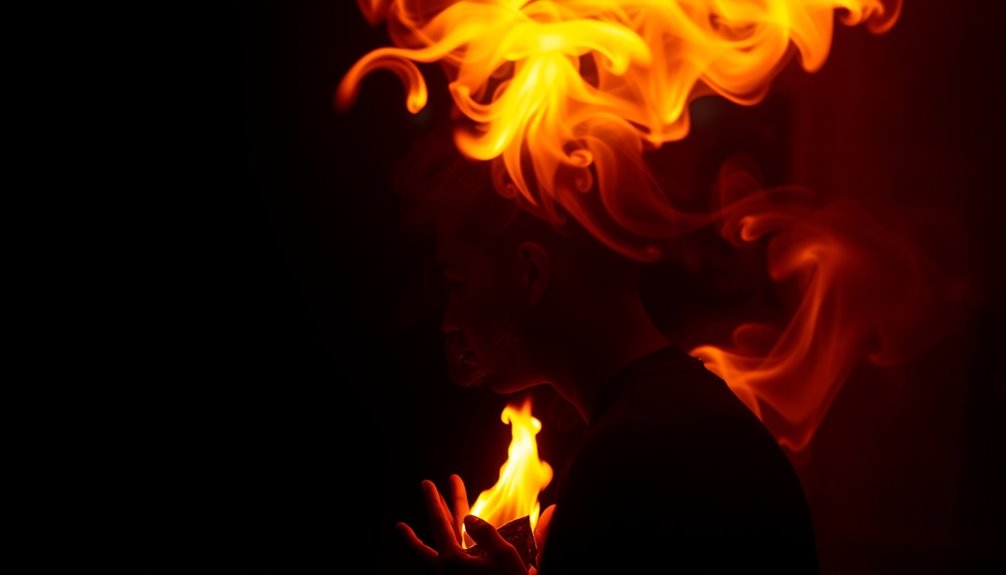
Amidst the oppressive backdrop of a dystopian society, fire evolves into a powerful symbol of enlightenment in "Fahrenheit 451." As Montag grapples with his emerging awareness, he discovers that fire can illuminate the truth rather than merely destroy it.
At first, you see fire as destructive, a tool that burns books and erases knowledge. But when Montag meets Granger and his group, he learns about fire's brighter side. They show him that fire can spark self-awareness and knowledge.
For instance, the woman who chooses to die with her books makes the ultimate sacrifice for knowledge, igniting Montag's journey toward enlightenment. He realizes that controlled fire can warm and brighten, different from the blazing and burning flames he once knew.
Montag's transformation deepens as he embraces fire's potential for renewal. He envisions a phoenix rising from the ashes, symbolizing hope and the possibility of a better society.
This new understanding reflects the joy of discovering light in darkness. Fire becomes a friend rather than an enemy, guiding Montag and you toward a future filled with knowledge and critical thought. Embrace this journey of enlightenment!
Key Characters and Fire
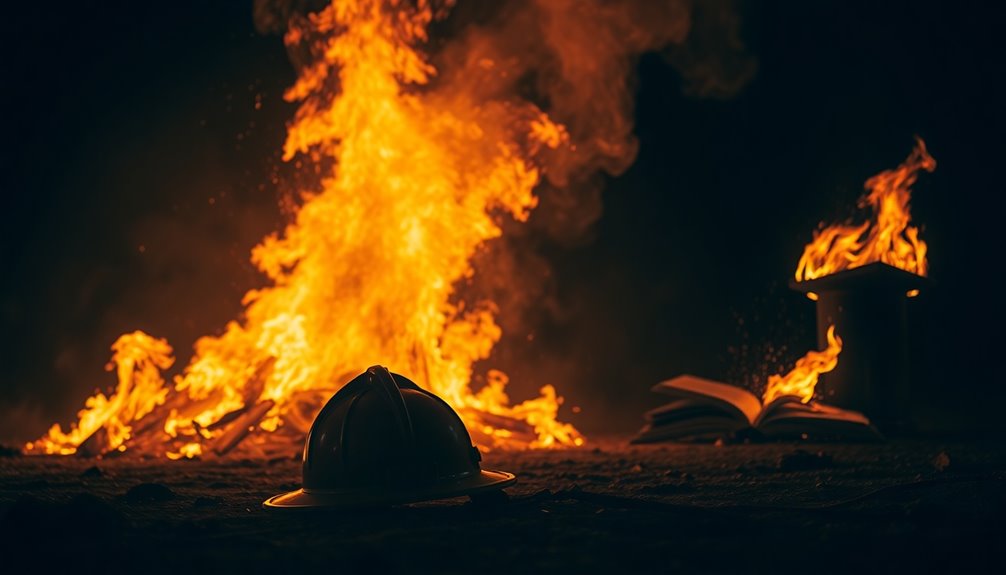
In "Fahrenheit 451," fire plays a big role in the journeys of key characters like Montag, Beatty, and Clarisse.
Montag starts as a fireman who loves burning books, but he slowly realizes that fire isn't just about fun; it can destroy ideas and dreams.
Meanwhile, Captain Beatty uses fire to control society, while Clarisse sparks curiosity in Montag, pushing him to think about fire's true meaning and its impact on their world.
Montag's Transformation Journey
Fire plays an essential role in Montag's transformation journey throughout *Fahrenheit 451*. At the start, you see Montag enjoying his job as a fireman, burning books without a second thought.
But then he meets Clarisse, and everything begins to change. Her curiosity sparks his own, making him question why he's been burning things.
As Montag witnesses a woman set herself on fire with her books, he realizes that fire isn't just about destruction; it symbolizes something much deeper—knowledge and freedom. This moment ignites a transformation within him.
Here are some key points about Montag's journey:
- From Destruction to Enlightenment: He shifts his view of fire from a tool of oppression to a source of illumination.
- Clarisse's Influence: Her questions challenge him to think differently about his world.
- The Burning Woman: This pivotal scene teaches him the value of knowledge over conformity.
- Reclaiming Fire: Montag's final act of burning Captain Beatty marks his rebellion and his newfound understanding of fire as a means of personal agency. This aligns with the importance of emotional alignment in recognizing one's true desires.
In the end, Montag embraces fire as a symbol of renewal and hope in a censored world. Additionally, this journey reflects the importance of self-care practices that foster personal growth and resilience in the face of adversity.
Captain Beatty's Authority
Captain Beatty stands as a formidable force of authority in *Fahrenheit 451*, wielding fire not just as a weapon but as a means to uphold censorship and suppress free thought. He believes that fire can cleanse society of dangerous knowledge. By burning books, he thinks he's protecting people from chaos and confusion.
Beatty's words, "Burn all, burn everything. Fire is bright and fire is clean," show how he values conformity over individuality. In his quest for control, he overlooks the vital role of self-care in empowerment, which allows individuals to think critically and challenge the status quo. Regular practices of effective relaxation techniques can help individuals manage stress and enhance their capacity for independent thought.
But there's a twist! Despite his disdain for books, Beatty knows a lot about literature. His deep understanding of ideas makes him even more dangerous. He uses this knowledge to justify the destruction of books, promoting an oppressive authority that leaves no room for personal agency.
You might feel a sense of excitement as you see how Beatty manipulates fire to maintain control. His actions highlight the struggle between knowledge and ignorance, individuality and conformity. In a world where cybersecurity measures are increasingly scrutinized, Beatty's approach reflects a broader fear of losing control over information.
Ultimately, Beatty's fate at the hands of Montag reveals the destructive consequences of his authoritarian rule. It's a powerful reminder that the fight for personal freedom and knowledge is worth every struggle, even against such an oppressive force.
Clarisse's Curiosity Spark
Curiosity serves as a powerful catalyst in *Fahrenheit 451*, embodied by the character Clarisse McClellan. Her inquisitive nature ignites Guy Montag's transformation, pushing him to question the world around him.
Clarisse's questions about happiness and life challenge Montag's acceptance of a society that uses fire to suppress knowledge. She shows him how the destructive role of fire can be seen differently.
With her influence, Montag starts to view fire not just as a tool for censorship but also as a possible source of enlightenment. Here are four key aspects of Clarisse's impact:
- Clarisse's curiosity opens Montag's eyes to the beauty in the world.
- Her fascination with nature contrasts with Montag's initial love for fire's destruction.
- She inspires Montag to seek knowledge instead of remaining in ignorance.
- Clarisse embodies the spirit of questioning, which sparks Montag's journey toward self-discovery.
Through Clarisse McClellan, we see that curiosity can light a path away from ignorance and toward knowledge. Her spark not only ignites Montag's transformation but also highlights the duality of fire symbolism in their society. Additionally, her character reflects the importance of mindfulness and respect in understanding the deeper meanings of life, akin to the principles found in traditional tea ceremonies.
Quotes Reflecting Fire Symbolism

One of the most striking aspects of "Fahrenheit 451" is how quotes throughout the novel encapsulate the complex symbolism of fire. Fire acts as both a symbol of destruction and a tool for control in society. It's fascinating how characters like Montag and Beatty express different views about fire. Let's look at some key quotes that highlight these ideas!
| Quote | Symbolism | Character |
|---|---|---|
| "It was a pleasure to burn." | Enjoyment of destruction | Montag |
| "A book is a loaded gun… Burn it." | Knowledge is dangerous | Beatty |
| "Burn all, burn everything." | Cleansing ideology | Beatty |
| "Those who don't build must burn." | Creation vs. destruction | Faber |
Montag initially finds joy in burning books, seeing fire as a means of oppression. Beatty warns that knowledge can be dangerous, urging society to eliminate it. His view of fire as bright and clean reflects a twisted sense of control. Finally, Faber's words remind us that destruction often follows inaction. These quotes show how fire symbolizes both the destruction of knowledge and the potential for change!
Themes of Fire in Society

Fire in "Fahrenheit 451" embodies the oppressive forces in society, transforming from a mere tool of destruction to a symbol of control and conformity. At first, Montag feels pleasure in burning books, reflecting how society sees fire as a way to destroy knowledge and enforce ignorance.
Bradbury uses fire to symbolize the loss of individuality and critical thought. But there's more to it!
Consider these themes of fire in society:
- Fire symbolizes destruction, as it's used to destroy books and eliminate dissent.
- Montag first enjoys burning, showing how deeply society is indoctrinated.
- The self-immolation of the woman highlights rebellion against censorship, showcasing bravery.
- Fire evolves into a symbol of transformation and the quest for knowledge.
As Montag questions the role of fire, he begins to realize its potential for enlightenment rather than just destruction. This journey of self-discovery shows that fire can also represent hope and change.
Ultimately, fire in "Fahrenheit 451" reminds us that knowledge is worth fighting for, and the power of rebellion can ignite a brighter future!
Frequently Asked Questions
What Does the Fire Symbolize?
Fire symbolizes a powerful force in many stories. It can represent destruction, as it burns down everything in its path.
But fire also brings warmth and light, sparking new beginnings. Think about how a campfire gathers friends, creating joy and connection.
It's fascinating how fire can change its meaning based on the situation. So, whether it's cozy or chaotic, fire reminds us of the dual nature of change and transformation in our lives!
What Is the Symbolism in Fahrenheit 451?
In "Fahrenheit 451," symbolism lights up the story like a bright flame.
You'll find that fire represents both destruction and hope. It burns away the old, oppressive ideas while sparking new thoughts and possibilities.
Characters face choices that reveal the power of knowledge. As you read, notice how fire transforms from a tool of control into a beacon of enlightenment.
This journey shows us the importance of balance between what's lost and what's gained.
What Does the Fire Symbolize in the Story to Build a Fire?
In "To Build a Fire," fire symbolizes survival and hope. It's your lifeline against the freezing cold of the Yukon.
When you see the man struggle to create a fire, you feel the tension between life and death. Fire represents warmth and safety, but it can also be destructive.
As he fights against nature, you realize that respecting the environment is essential. The fire's flicker reflects both his determination and the challenges he faces.
What Is the Purpose of Fire According to Beatty?
According to Beatty, fire serves a powerful purpose.
It's a tool for control, helping to wipe out books and ideas that challenge the government. He thinks fire is bright and clean, making society feel simple and free from difficult thoughts.
Conclusion
In "Fahrenheit 451," fire is like a two-faced coin! It can warm your heart or burn your dreams to ashes. On one side, it destroys knowledge and freedom, like a greedy dragon gobbling up all the books. On the other, it lights the way to understanding and change, like a friendly campfire inviting everyone to gather around. So, next time you think of fire, remember, it's not just flames; it's a spark of hope or a fiery disaster waiting to happen!

